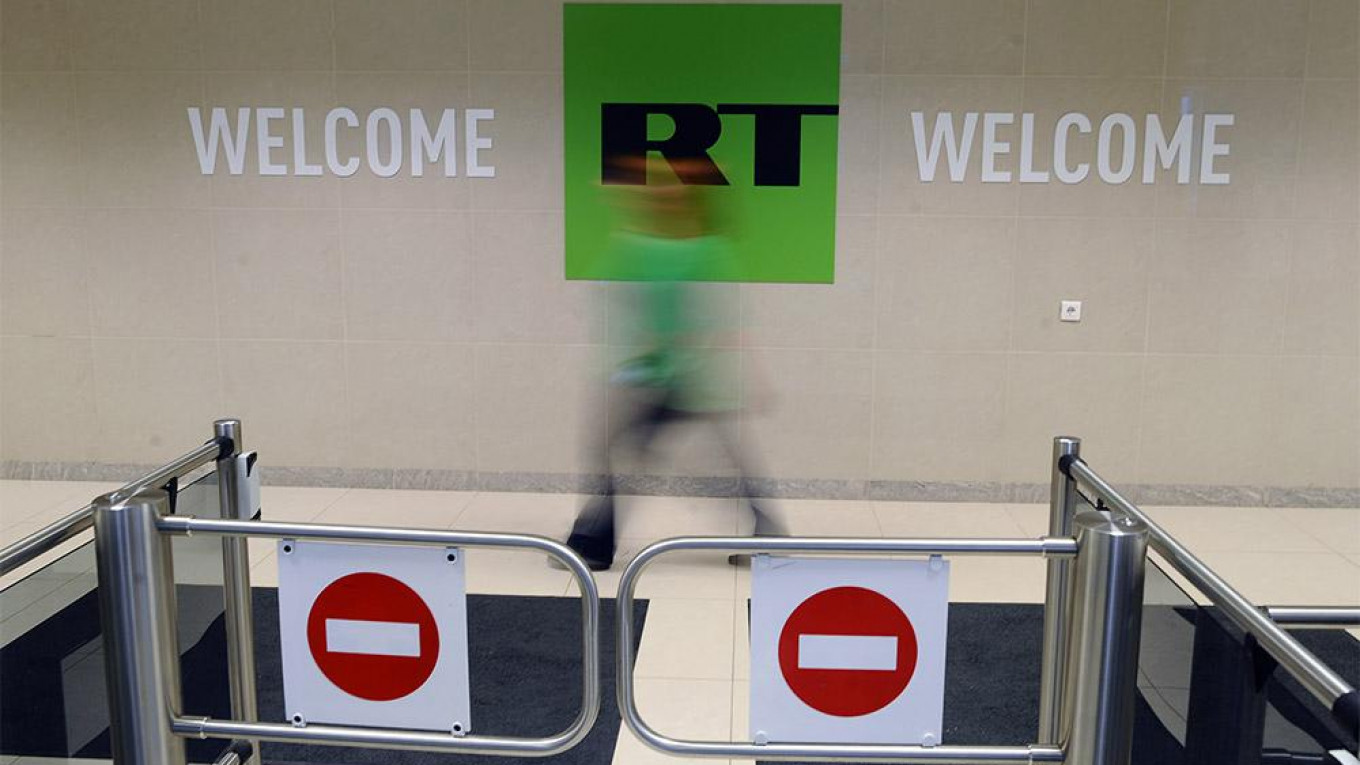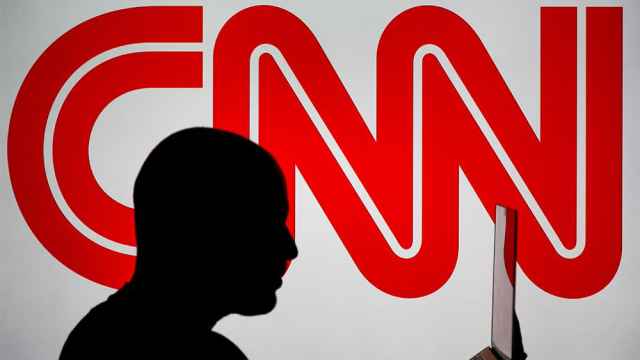An obscure U.S. law, meant to guard against foreign propaganda, has been the driving force behind escalating U.S.-Russia tensions in recent weeks. Designed nearly a century ago, it could now force the Kremlin’s RT news outlet to register as a “foreign agent” — and push the precipitous U.S.-Russia relations over the edge.
The law is the 1938 Foreign Agent Registration Act (FARA), which has come into the spotlight as a result of the ongoing U.S. investigations into Russia’s alleged 2016 presidential election meddling.
Since the launch of the investigations, FARA has been applied to two of US. President Donald Trump’s campaign officials, Paul Manafort and Rick Gates, who were accused of failing to register as foreign agents.
It has also been applied to Russian media outlets: In September, RT was asked to register as a foreign agent. And Yahoo News reported that the FBI is investigating whether Sputnik, another Kremlin-controlled outlet, violated FARA too.
On Thursday, the RT news channel said it will indeed register, though Russian officials are warning they will impose restrictions on U.S. media in retaliation as early as next week. The network, which missed a deadline in October, said that it faces a new date — Monday, Nov. 13 — to comply with the law.
RT Editor-in-Chief Margarita Simonyan said that the head of RT America could be arrested and the channel’s assets seized if it failed to register.
“Between these consequences and registration as a foreign agent, we are forced to choose registration,” Simonyan said on RT. “Although, of course, we categorically disagree with this requirement.”
What is FARA?
The law requires any individuals or entities representing a foreign government in the U.S. to register as a foreign agent. The Department of Justice’s FARA site notes that there are currently 402 active registrants, including China Daily, a state-owned newspaper, and NHK, a Japanese broadcaster. Lobbying groups, public relations firms — even tourism groups — are all currently registered under the statute.
The act was passed during World War II with the intention of limiting Nazi propaganda in the U.S.
As the Department of Justice’s Inspector General noted last year, the congressional committee which recommended the law’s enactment had determined that “the Nazi German government had established an extensive underground propaganda apparatus using American firms and citizens.”
“The purpose of the law is to increase transparency,” Dan Pickard, a partner at the law firm Wiley Rein LLP, and a leading expert on FARA in the U.S., told The Moscow Times. “FARA is a disclosure statute,” he said, requiring the registered entities to periodically and publicly provide updates of their relationship with the foreign country and their activities within the U.S.
What does FARA require of registrants?
In addition to registering as a foreign agent, FARA requires individuals or organizations on the list to file bi-annual reports disclosing foreign funding.
They must also send materials they produce to the FARA office, and a portion of the materials must carry disclaimers. China Daily, for example, carries a disclaimer on its website and Facebook page.
Steve Vladeck, a law professor at the University of Texas and a specialist on national security law, told The Moscow Times that FARA is “designed not to minimize foreign influence in American politics, but to make it as transparent as possible — on the theory that the public has a right to know when particular initiatives are being pushed on behalf of foreign governments, corporations, or persons.”
Why RT and Sputnik?
In a January U.S. intelligence report, RT and Sputnik were singled out for contributing to Russia’s influence over the 2016 U.S. presidential election.
“Russia’s state-run propaganda machine — comprised of its domestic media apparatus, outlets targeting global audiences such as RT and Sputnik, and a network of quasi-government trolls — contributed to the influence campaign by serving as a platform for Kremlin messaging to Russian and international audiences,” the report's authors wrote.
As the investigations into Russian influence of the election ratcheted up in recent weeks, so too did calls in the U.S. to register RT and Sputnik under FARA.
“The indictments of Paul Manafort and Rick Gates for violating FARA indicate just how important it is that this law be applied to RT, Sputnik and other such entities,” James Kirchick, a visiting fellow at the Brookings Institution who has advocated for FARA to be applied to RT and Sputnik, told The Moscow Times.
In September, the Atlantic Council, a Washington-based think tank, published a report outlining the legal case for requiring RT to register as a foreign agent.
The report pointed out that, during the Cold War, TASS had its New York bureau registered under FARA, and that Pravda, Izvestia, RIA Novosti, Radio Moscow, and Soviet Life Magazine all, at various points, had their U.S. correspondents registered as foreign agents.
More recently, NTV had registered correspondents, and, until 2005, so too did RIA Novosti.
What are the potential repercussions?
RT responded to the U.S. Department of Justice order to register as a foreign agent immediately and defensively.
"The war the U.S. establishment wages with our journalists is dedicated to all the starry-eyed idealists who still believe in freedom of speech,” said Margarita Simonyan, RT’s editor-in-chief. “Those who invented it, have buried it.”
On Oct. 19, Anna Belkina, RT’s head of communications, told CNN that RT’s “legal team has been doing everything possible for RT to avoid having to register under FARA.”
Sputnik responded too. Mindia Gavasheli, the editor of its Washington bureau, told RT that the FBI investigation into their work is not surprising because of the “atmosphere of hysteria” surrounding anything related to Russia in the U.S. “Everything with the word ‘Russian’ is seen through the prism of spy mania,” he said.
Vladeck, the law professor, argues that the only purpose and result of FARA will be to “bring into the sunlight perfectly legal actions the sponsors of which might nevertheless have preferred to stay hidden in obscurity.”
In an April blog post about the statute, Vladeck wrote, “FARA itself does not prohibit any conduct. It just requires registration, and creates both civil and criminal penalties for an individual’s willful (1) failure to register; or (2) making of a false statement or omission of a material fact in connection with their registration.”
Still, some advocates in the U.S. are worried about the ramifications.
"Say what you will about Sputnik or RT,” Gabe Rottman, the Washington director of PEN America, a group that advocates for free speech, said in September. “The biggest concern with the FBI focusing on a foreign-owned media organization as a suspected foreign agent is retaliation against U.S.-supported outlets such as Voice of America or public broadcasters like the BBC.”
Indeed, Moscow’s retaliatory measures could come as early as next week, Foreign Ministry spokeswoman Maria Zakharova warned on state-run television on Thursday.
The State Duma then announced on Friday that lawmakers and experts were drafting amendments to Russia’s controversial foreign agent law to include media organizations.
CNN, Voice of America, Radio Liberty and its “Current Time” television channel are likely to face restrictions, Senator Alexei Pushkov, who chairs the Federation Council’s Information Policy Committee, told the state-run RIA Novosti news agency on Friday.
“Let’s unpack the surprise in parts,” Zakharova said when asked by a state television host whether U.S. newspapers would have to pack their bags.
A Message from The Moscow Times:
Dear readers,
We are facing unprecedented challenges. Russia's Prosecutor General's Office has designated The Moscow Times as an "undesirable" organization, criminalizing our work and putting our staff at risk of prosecution. This follows our earlier unjust labeling as a "foreign agent."
These actions are direct attempts to silence independent journalism in Russia. The authorities claim our work "discredits the decisions of the Russian leadership." We see things differently: we strive to provide accurate, unbiased reporting on Russia.
We, the journalists of The Moscow Times, refuse to be silenced. But to continue our work, we need your help.
Your support, no matter how small, makes a world of difference. If you can, please support us monthly starting from just $2. It's quick to set up, and every contribution makes a significant impact.
By supporting The Moscow Times, you're defending open, independent journalism in the face of repression. Thank you for standing with us.
Remind me later.







